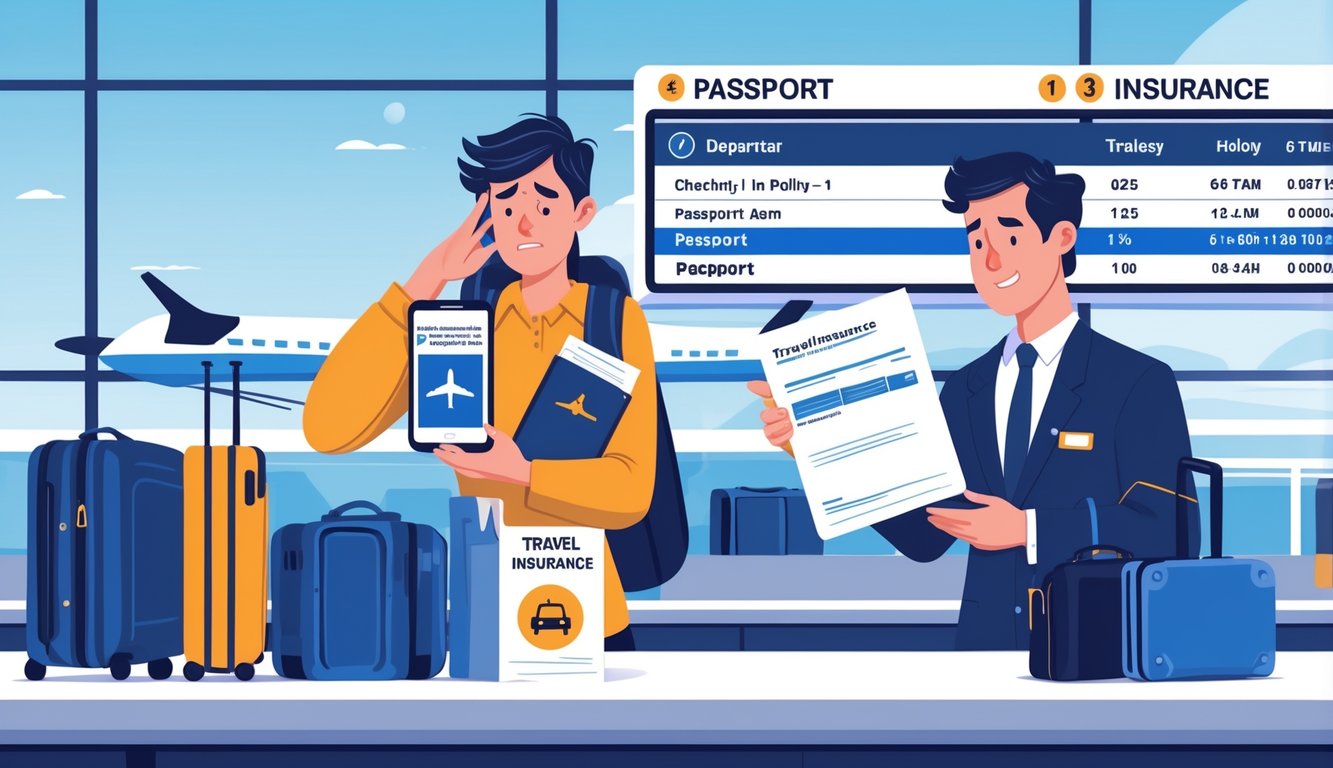
Peace of Mind: The Value of Travel Protection
Tossed my passport in a backpack, did the classic charger shuffle—sure, like I’ll ever use half of them—and still, somehow, missed the one thing that could’ve saved me a stupid amount of money. I think I read somewhere (or maybe just saw it in a meme?) that most people skip travel protection and then only remember it exists when their trip goes sideways. Nobody brags about paying out-of-pocket when their luggage disappears or their flight gets canceled. Shocker.
Minimizing Risks with Comprehensive Coverage
Honestly, I’ve lost count of how many times friends or clients have called me mid-meltdown because their trip imploded and their “oh I’ll get around to it” policy wasn’t in place. Not rare. NerdWallet’s best travel insurance for 2025 shouts about all the ways you can get hosed—lost bags, missed connections, random illnesses—if you don’t lock in coverage before you leave.
Here’s the kicker: no insurance company is going to swoop in and save your wallet after the disaster. No magic “retroactive” button. You’ve got to plan ahead. My cousin? He canceled a $4,000 cruise because his kid got chickenpox, then tried to buy insurance after the fact. Guess what? No refund. Just a very expensive lesson.
Joe Cronin from International Citizens Insurance says people think travel insurance is pricey, but sometimes it’s literally a dollar a day. Nobody wants to read the fine print (I sure don’t), but you really don’t want to find out what’s not covered while you’re stranded at the airport.
Planning Ahead for Unforeseen Events
Why do we all walk around thinking, “I’m careful, nothing will happen to me”? I mean, I’m not. Airlines strike, wildfires close airports, hurricanes just… exist. And yet, I overheard some guy saying he’d skip insurance to “save money,” then watched him drop $3,000 on a new ticket home. Good luck with those savings.
Trip interruption? Say you’re stuck somewhere because of a storm and the next flight isn’t until next week—some plans will actually help with lost hotel nights, meals, and all those non-refundable tours you booked. I’ve seen medical evacuations cost more than a new car if you’re uninsured. Onshorekare.com just lays it out: don’t expect your credit card to cover adventure sports or pre-existing conditions. Learned that one the hard way after a hiking accident in South America.
Travel protection isn’t a crystal ball, but stacking the deck a little? Worth it. Found an old hotel receipt from 2019—no insurance, snowstorm, lost every cent. Lesson (maybe): if you wait until your flight’s delayed to buy a policy, just forget it.
Frequently Asked Questions
Last-minute insurance shopping is a joke. I once argued with an airline rep while frantically trying to buy coverage at the gate—total fail. Airlines and insurers don’t budge on their rules, and missing the window can cost a lot more than you’d think. Especially if you’re flying internationally.
What’s the latest I can purchase travel insurance before my trip?
There’s always someone at the airport trying to buy insurance with seconds to spare. Doesn’t work. Most insurers want you to buy before you board or check in. Some let you get away with it until the day before; others cut you off a few hours ahead. TravelSupermarket breaks down the fine print—if you can survive their pop-ups. Ever tried convincing an insurer after you’re already on the plane? Yeah, same. Didn’t work.
Can you get travel insurance after booking your international flight?
So you booked your flight and totally forgot about the insurance. Welcome to the club. You can still buy a policy after booking, but only if you haven’t started the trip or, you know, already had something go wrong. (Announcing you’re sick on Instagram and then trying to buy coverage? Not gonna fly.) MoneySavingExpert says buy as soon as you book. Waiting just means more stuff isn’t covered. Met a couple at a layover once trying to add cancellation coverage—airline staff just shrugged.
When does travel insurance typically become effective, and when does it expire?
Sat next to a claims adjuster once (weird flight, long story). Apparently, your policy kicks in as soon as the payment clears—sometimes instantly, sometimes after a few hours. It covers your pre-paid expenses right away, but the actual travel coverage usually runs from your trip’s start to the official end date, sometimes with a 24-hour grace period if you’re lucky. Depends on your contract. The Post Office goes into excruciating detail about this, but if you extend your trip and don’t update your policy? You’re on your own.
Is it possible to add travel insurance once my journey has already begun?
People love to imagine there’s a loophole. Halfway through the trip, sunburnt and panicking, they Google “last-minute travel insurance.” Sorry, but every legit provider I’ve checked—and the agent who looked at me like I was nuts in Rome—says no. You need to buy before you start your trip. Maybe you can add gadget insurance or something, but the main policy? No dice. Admiral’s FAQ says it’s basically against the rules of the universe.
Why should you consider travel insurance for international trips?
I get the skepticism. From your couch, everything looks fine. But try navigating a hospital bill in a language you don’t speak. Needed stitches in Tokyo once, and only then did I find out that those insurance hotlines actually do something. ABI says millions are lost every year by people who skip insurance. And don’t even get me started on airlines tossing around “acts of God” to avoid giving refunds.
Are there any reputable travel insurance providers you would recommend?
My phone’s a graveyard of half-finished quote forms and, honestly, I’m still not sure which one I trust. I mean, is anyone actually excited about travel insurance? The Post Office, Admiral, Aviva, Staysure—yeah, those names pop up all over the place, and apparently they haven’t been completely annihilated by complaints or whatever. I guess that’s something. I got lost in the Post Office FAQ for like twenty minutes—so many exclusions, I started to wonder if they’d cover me tripping over my own shoelaces. Admiral hides everything in PDFs, which, thanks, super helpful. I keep flipping between sites, but honestly, the shiniest homepage probably just means they spent more on web design than claims. And half these bargain policies? They’ll cover your lost toothbrush but not, you know, anything you actually care about. Why is this so hard?



